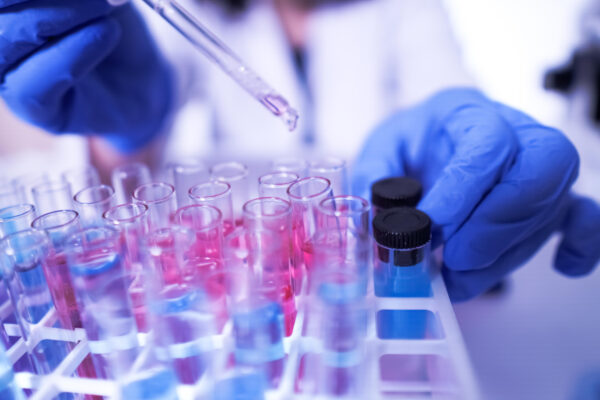
British drugmaker AstraZeneca has started an early-stage clinical study of a new combination therapy for Covid-19.
The London-based biopharma company said Tuesday that it had dosed the first healthy volunteers in a Phase I trial of AZD7442, a combination of two monoclonal antibodies that it is developing for prevention and treatment of Covid-19. The trial will enroll up to 48 participants aged 18 to 55 and is taking place in the U.K., but is funded by the U.S. Department of Defense’s Defense Advanced Research Projects Agency, or DARPA, and the Department of Health and Human Services’ Biomedical Advanced Research and Development Authority, or BARDA.
AstraZeneca in-licensed AZD7442 from Vanderbilt University in the U.S., whose researchers derived it from antibodies found in convalescent patients who had recovered from Covid-19, while the drugmaker applied its in-house technology for extending monoclonal antibody half-life and reduced Fc receptor binding. It is hoped that the drug will provide at least six months of protection from Covid-19.
“This trial is an important milestone in the development of our monoclonal antibody combination to prevent or treat Covid-19,” AstraZeneca executive vice president for biopharmaceuticals research and development Mene Pangalos said in a statement. “This combination of antibodies, coupled to our proprietary half-life extension technology, has the potential to improve both the effectiveness and durability of use in addition to reducing the likelihood of viral resistance.”
While small-molecule drugs like remdesivir have shown efficacy against the SARS-CoV-2 virus, a risk is that it can develop resistance against them. Thus, targeting it with a cocktail of two-antibodies – akin to the cocktail approach to HIV treatment – is seen as a way to overcome potential resistance mechanisms.
In that sense, AstraZeneca is taking the same approach as Regeneron Pharmaceuticals, whose drug REGN-COV2 also uses a two-antibody cocktail approach. That drug is already in late-stage development, and the Tarrytown, New York-based drugmaker announced earlier this month a deal with Swiss drugmaker Roche to distribute the drug outside the U.S. AstraZeneca’s study is a randomized, double-blind, placebo-controlled trial whose listed completion date is Sept. 14, 2021.

A Deep-dive Into Specialty Pharma
A specialty drug is a class of prescription medications used to treat complex, chronic or rare medical conditions. Although this classification was originally intended to define the treatment of rare, also termed “orphan” diseases, affecting fewer than 200,000 people in the US, more recently, specialty drugs have emerged as the cornerstone of treatment for chronic and complex diseases such as cancer, autoimmune conditions, diabetes, hepatitis C, and HIV/AIDS.
Photo: appledesign, Getty Images













